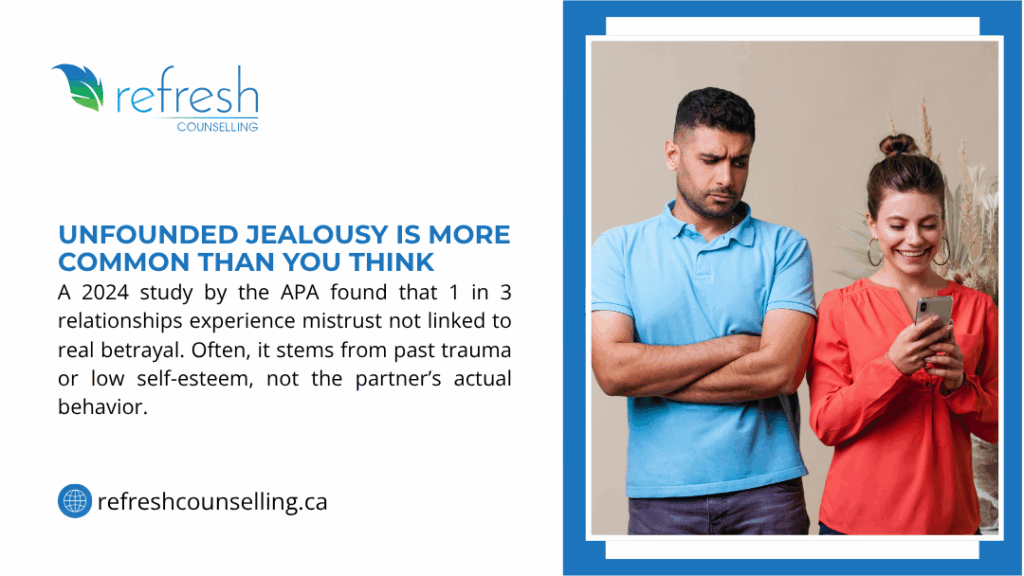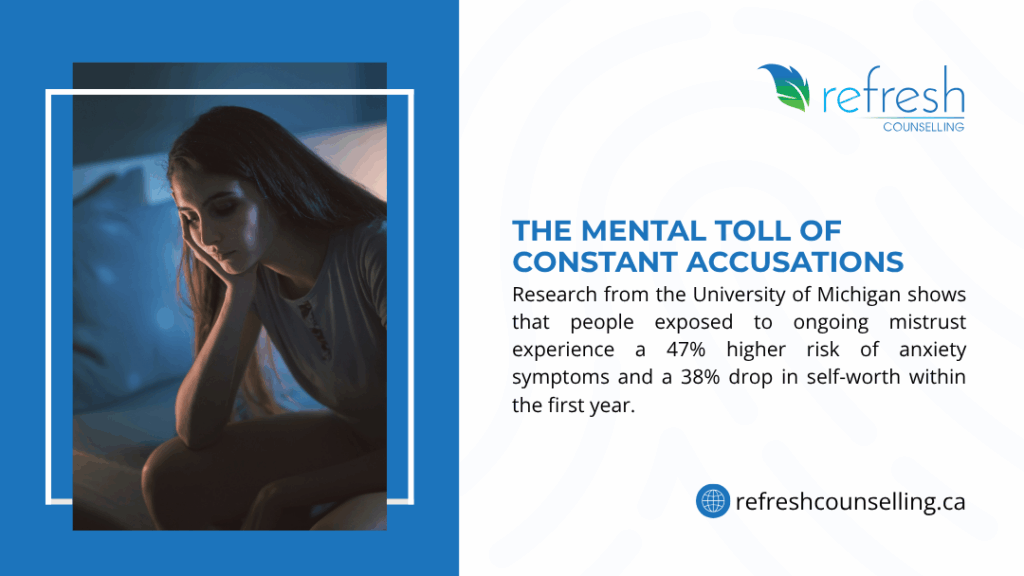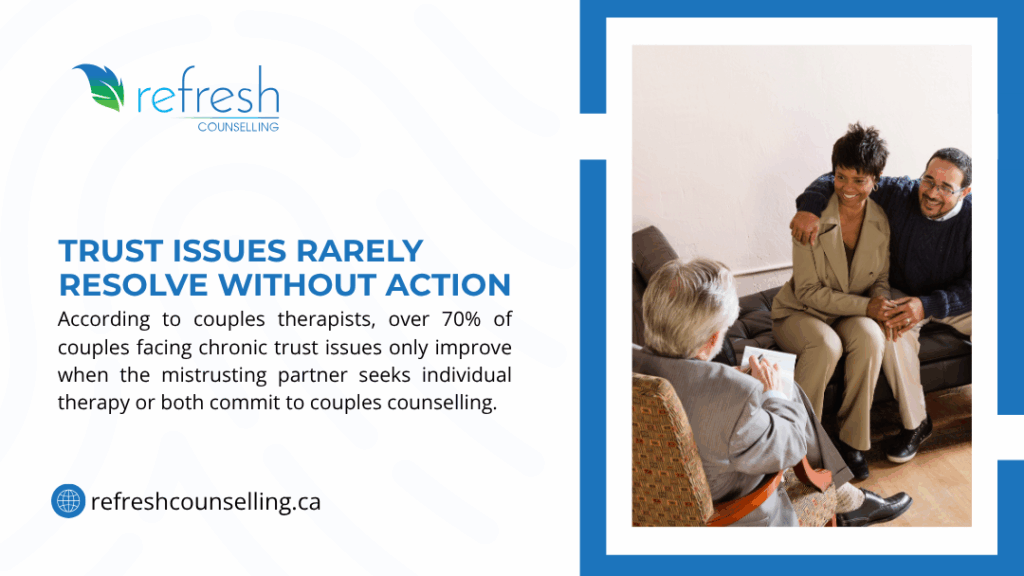When you find yourself thinking “my boyfriend doesn’t trust me but I haven’t done anything,” you’re facing one of the most frustrating relationship challenges. You want to be supportive of his struggles, but defending yourself against imaginary threats becomes exhausting and unfair.
This article helps you understand why partners develop unfounded trust issues, how their behavior affects your mental health, and what practical steps you can take to address this situation.
Why Does He Struggle to Feel Secure in the Relationship?
Past relationships often hold the key. If his ex cheated, his nervous system learned to stay on high alert. Even though you’re completely different, his brain can’t separate past threats from present safety.
Common Sources of Trust Issues | How They Show Up | Impact on Current Relationship |
Previous partner cheating | Checks your phone and social media constantly | Privacy disappears completely |
Childhood abandonment | Panics when you don’t respond immediately | Creates suffocating need for reassurance |
Parent’s infidelity | Assumes all partners eventually cheat | Projects parent’s behavior onto you |
Anxiety disorders | Creates worst-case scenarios from normal situations | Turns everyday activities into threats |
Low self-esteem | Believes they don’t deserve loyalty | Reads betrayal into normal behavior |
The Mental Health Impact of Constant Suspicion
Being under constant suspicion takes a serious toll on your psychological wellbeing. The stress of perpetual defense creates its own mental health challenges.
Living with unfounded suspicion often triggers:
- Hypervigilance about your own behavior – You monitor everything to avoid triggering his suspicion
- Guilt despite innocence – Constant accusations can make you feel guilty for nothing
- Anxiety about normal activities – Talking to coworkers becomes a source of stress
- Resentment that builds slowly – Being treated like a criminal creates natural anger
Your self-esteem suffers when someone you love doesn’t believe in your character. You start questioning your own worth. Some people even develop depression from chronic stress.
The isolation gets worse too. You might avoid friends because it’s easier than dealing with the interrogation afterward. This gradual shrinking of your world is a serious red flag.

Normal Concerns vs. Controlling Behavior
Not all relationship concerns are unhealthy. Knowing the difference helps you respond appropriately.
Healthy Boundaries | Controlling Behavior | Your Response Options |
Asks about your day with interest | Demands minute-by-minute accounts | Set limits on detail sharing |
Wants to meet your friends | Forbids certain friendships | Keep friendships, offer compromise |
Expresses hurt feelings | Makes accusations without evidence | Validate feelings, reject blame |
Requests couple time | Isolates you from support | Balance together and apart time |
Shares social media naturally | Demands all passwords now | Discuss privacy boundaries |
Frequency and intensity matter. Occasional insecurity that responds to reassurance differs from daily interrogations that never bring peace. When you’re constantly defending perfect behavior, the problem is his unresolved issues.
Communication Strategies That Help
Addressing trust issues requires careful communication. You need to acknowledge his feelings without accepting unfair treatment.
Start conversations when you’re both calm. A sentence as “I understand you’re struggling with trust, and I want to work through this together” opens dialogue better than defensive responses during accusations.
Use specific examples:
- Instead of “You never trust me,” try “When you read my texts without asking, I feel violated even though I have nothing to hide”
- Rather than “You’re being crazy,” say “I notice you get anxious when I don’t respond immediately”
- Replace “This is your problem” with “How can we build the trust you need together?”
Clear boundaries protect your mental health. You might say “I understand your trust issues, but checking my phone makes me feel like a criminal. We need to find another way.”

When Professional Support Becomes Necessary
Some trust issues need professional intervention to address underlying causes. Recognizing your limits protects both your mental health and the relationship.
Signs You Need Professional Help | Type of Support Needed | Expected Outcomes |
Daily accusations despite evidence | Individual therapy for him | Addresses root causes |
Your mental health declining | Individual counselling for you | Builds coping strategies |
Communication always escalates | Couples counselling together | Improves dialogue patterns |
Past trauma driving behavior | Trauma-informed therapy | Heals old wounds |
Controlling behavior increasing | Safety planning support | Protects your wellbeing |
Professional support is an investment in health and happiness. A therapist can identify whether his trust issues come from anxiety, trauma, or other conditions that need specific treatment.
Protecting Your Own Mental Health
Supporting a partner with trust issues requires protecting your psychological wellbeing. You can’t help someone else if you’re drowning.
Maintain connections with friends and family who remind you of your worth. These support systems provide reality checks when constant suspicion makes you question yourself.
Practical self-care strategies:
- Journal your experiences to maintain clarity about reality versus his imaginations
- Keep activities that bring joy that have nothing to do with proving innocence
- Practice stress-reduction like meditation or exercise for chronic stress
- Maintain individual interests that give you identity beyond being suspected
Remember that thinking “my boyfriend doesn’t trust me but I haven’t done anything” reflects his internal struggles, not your character. You deserve trust and respect. Accepting less isn’t noble – it’s harmful.
Your Options Moving Forward
You generally have three paths when dealing with unfounded trust issues that won’t improve.
First option: Stay and work through issues together. This requires both partners committing to change. He must acknowledge his problems and actively work on them through therapy. You maintain boundaries that protect your mental health.
Second option: Accept the current situation. This rarely works long-term because constant suspicion erodes mental health and satisfaction. Few people can maintain wellbeing while perpetually suspected.
Third option: Leave if trust issues persist without improvement. Sometimes protecting your mental health means walking away from someone who can’t or won’t address their problems.

Finding Professional Support in Calgary
Refresh Counselling provides expert assistance for both individuals and married couples. Our therapists in Calgary empathize with the frustration caused by wrongful suspicion when you’re innocent.
Couples’ therapy gives each partner the opportunity, through learning and practicing new patterns, to explore the subject of trust in a more effective way. Do not hesitate to get in touch with our team to find out how professional help can be the key to your mental health during this difficult time and your overall well-being.
